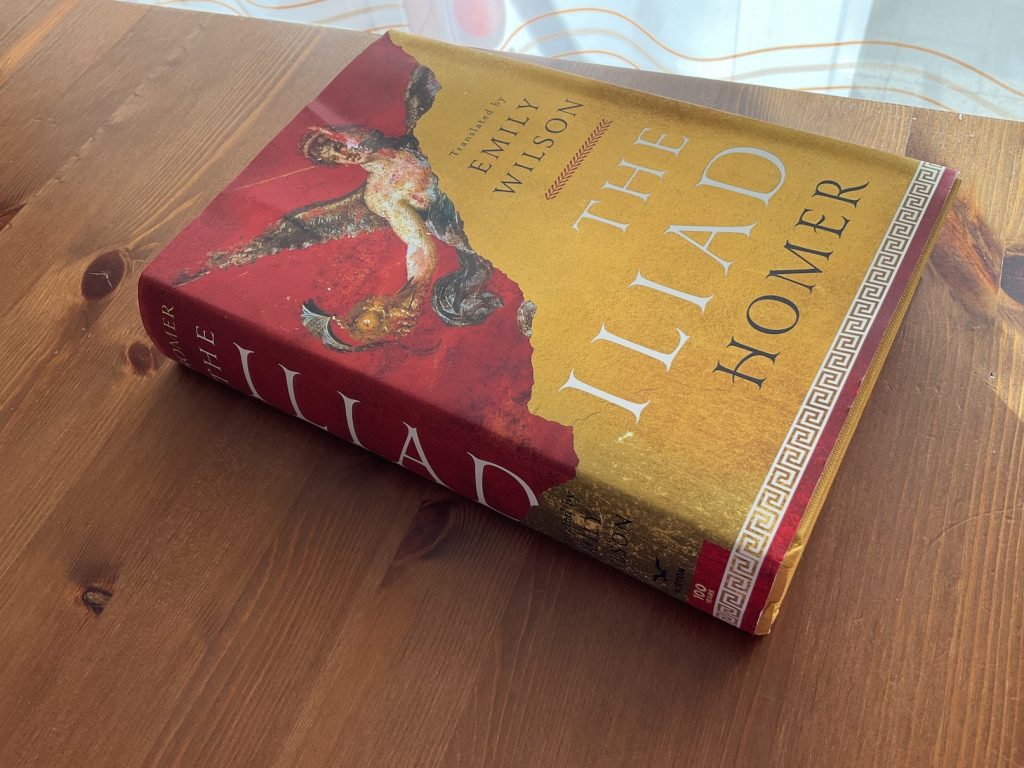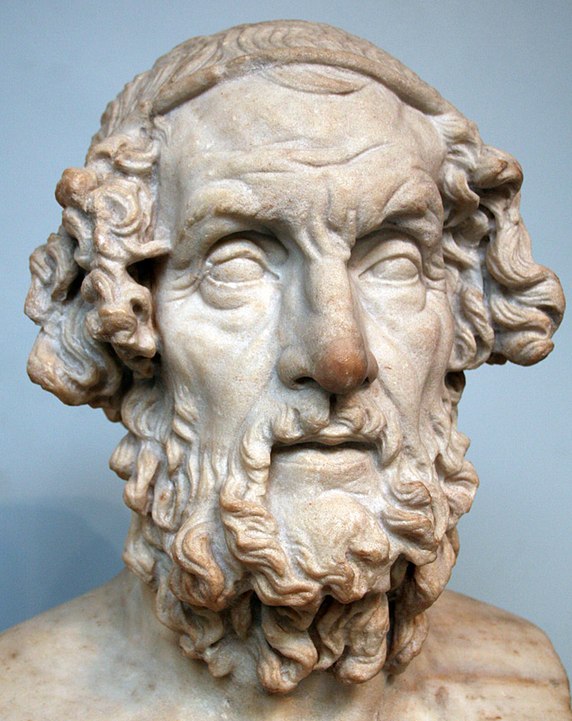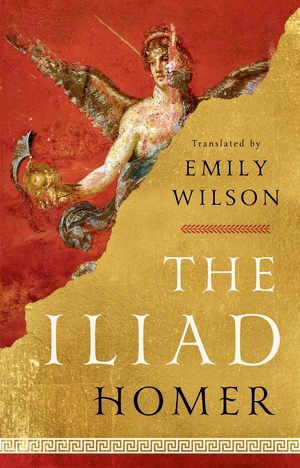During the UK leg of her book tour at the end of last year, Emily Wilson accepted the London Review of Books invitation to present her Iliad translation. And they found a wonderful discussion partner for her in Edith Hall. And complimented by a thespian pair conjured from amongst the embarrassment of riches which is the theatrical talent of a nation – Juliet Stevenson and Tobias Menzies. Stellar, I say! Such an evening could only happen in London.
Tag: The Iliad
(my reading of) “The Iliad”
Project-in-Waiting
So personally rewarding and intellectually enriching was a previous project in which I studiously followed through with a reading of Emily Wilson’s 2017 translation of Homer’s Odyssey – an endeavor that stretched over an entire year – that I would like to set forth again on another literary escapade; again, with the intention of an equally rigorous (but unfettered by expectation) immersion in Wilson’s newly published translation of The Iliad – considered by many to be the more complex of the Homeric epics. Though I have read and explored the Iliad at other times (as the name I write under here suggests!) and in other translations and contexts, I look forward to doing so again – especially this time with this translation – in some form or another. (I admit to having browsed excitedly through this new volume immediately it landed on my doorstep; dipping in, tasting again that particular rhythm and cadence that Wilson brings to her translation, and which had so enchanted me previously.)
I already imagine (though I am not absolutely committed; this to be determined by the necessary motivation and available time) a future project presenting itself in a similar format as that of the Odyssey; writing or posting in some (not yet defined) format as I read, with some regularity and without any unqualified attempt at interpretation, rather reflecting my own personal, perhaps idiosyncratic, meditations along the way. What I definitely can say is that any future commentary and ensuing citations – page numbers, book numbers and their titles – will follow my own hardback first edition copy:
Homer, The Iliad, translated by Emily Wilson, First Edition, New York: W.W. Norton, 2023.

For my Odyssey project I video-recorded my readings; a first for me ([muted applause] Stop, I say!), and which was absolutely not a vanity thing (here speaks one amongst those of my acquaintance who shudders when faced with the task of a selfie or the like even in own company!), rather an approach decided upon having become infected by Wilson’s own enthusiasm for recitation and her encouragement for others to follow suit. In the end, I indeed found the effort worthwhile in helping me maintain concentration and involvement in the text and narrative; for that reason, it is an oral exercise that I would very much like to repeat; however, I also now know that it is one that demands a significant amount of time and space – the former (despite my incessant claims to the contrary!) I can arrange; the latter, not always – and so I may have to be a bit more modest in my aspirations and selective in my intentions.
Poet and Translator

Having written before on this most unlikely pair; the ancient Greek poet, Homer, and this, his (or their) most recent and, I would contend, most interesting of modern translators: Dr. Emily Wilson, professor of classical studies at the University of Pennsylvania, it is hardly necessary that I do so again in any detail. Besides, in respect to Dr. Wilson, her renown is now such that there is a multitude of information – from her and about her – available in the internet, and, when it comes to the ancient bard, sowieso.
But in these days we call our own, when digital (and beyond, see A.I.) mass reproduction and the ensuing aesthetic dominate, it is difficult to get away without pictures – moving or otherwise – and visual representations are, after all, a powerful stimulant for the imagination. With this in mind, and with the observation that Homer surprisingly still retains the same stony gaze and, momentarily feigning blindness to the vagaries of the historical record, I republish an image (r.); chiseled from marmor, then iterated until the imagination and reality has morphed into one thing, something akin.
The very few years that have passed and the extraordinary success that has come her way, have also done little to change Emily Wilson’s charm and presentation (neither blinded by her success nor stony in her demeanor! but surely the tattoos are new?), but I did want to add something recent and so below is the video of an event at the Library of Philadelphia a short time ago to promote her newest work. Here, she is in conversation with Sheila Murnaghan, chair of the Department of Classical Studies at Penn (and, therefore, Emily’s colleague).
As the end of the year quickly approaches, I presume this to be a “project-in-waiting” of sorts – on my agenda for sometime in the next, or beyond. For the time being, I will pin this notice of intent under a new menu item in Classical Diversions, and will post here again in a timely fashion when I am ready to begin. I will of course remain alert to articles, reviews, interviews, etc. on the aforesaid writers and their epic adventures in this earthly space time continuum or perhaps another.
The Iliad by Homer, translated by Emily Wilson review – a bravura feat | Homer | The Guardian
Six years on from her translation of the Odyssey, Wilson revels in the clarity and emotional clout of Homer’s battlefield epic
— Read on www.theguardian.com/books/2023/sep/27/the-iliad-by-homer-translated-by-emily-wilson-review-a-bravura-feat
There are sure to be many in the next days, weeks, so as I come across new reviews I’ll directly post them (if possible) – and comment later if I think necessary . This from Edith Hall, who hardly needs an introduction – but here’s one anyway.
What to read this autumn: 2023’s biggest new books | Books | The Guardian
Sara Pascoe’s new novel, rare Terry Pratchett, memoirs from Barbra Streisand and Britney Spears, plus the essential reading on today’s hot button topics – all the releases to look out for
— Read on www.theguardian.com/books/2023/aug/26/what-to-read-this-autumn-2023s-biggest-new-books
Autumn is it absolutely not in the south of Germany! The warmest of sunshine, leaves barely tinged and little change in sight. But nevertheless it is a good time to start planning for days indoor. For this “The Guardian” has some good suggestions. Not necessarily those mentioned above in their pulled quote, though by Streisand I could be tempted. Of the others, some expected and therefore of no surprise: Zadie Smith, Mary Beard, Emily Wilson. And one who I will be particularly thrilled to read again after all her travails in the last few years: Jesmyn Ward – for this I have been waiting.
According to Emily Wilson
It is 26 September 2023 and Emily Wilson’s translation of Homer’s The Iliad is published today.
To whet the appetite, some of the first reviews:
- Natalie Haynes in the NYTimes
- Daniel Walden: The Bulwark
- Naoíse Mac Sweeney: The Washington Post
- A.E. Stallings: The Spectator
- Emily Greenwood: The Yale Review
No, they have not been thoroughly read, but I can say the headers and quick scans of each suggest – more than suggest – high praise, and sung in unison. Which would delight the Muses no end. Emily Wilson, herself, seemed particularly taken with The Bulwark (not known to me – looks really interesting, but mostly sub. based) piece. As she tweeted:
Wonderful Iliad review in The Bulwark. “Wilson’s deep love for and understanding of the Iliad…shine throughout this superb translation. The completion of her verse Homer amounts to nothing less than the renewal of an English poetic tradition”. https://t.co/xvN3rpIyhc
— Dr Emily Wilson (@EmilyRCWilson) September 26, 2023
Beyond the book, gossipy even (and adventurous: wouldn’t you like an assignment that takes you to Ithaca? And not that one in the Empire State), is Judith Thurman’s piece for The New Yorker “How Emily Wilson Made Homer Modern”. An entertaining read, though the “modern” of the title, if one is to understand correctly Wilson’s comments in the above thread where she makes a point of voicing her displeasure at a simple reception with the claim of “modernizing Homer”, is probably misplaced. Also, Charlotte Higgins’ piece in The Guardian a couple of weeks ago writes of the the technical choices Wilson contended with in her translation of the Iliad that culminated in today’s publication.
And at Lit Hub, Emily Wilson in conversation with her friend, Madeline Miller, reveals further insights into her methodology as a translator, the psychological depth of Homer’s poetry and into her character interpretations – also a great read:
And, finally, a diary entry unto myself: BBC Radio 4 Start the Week on Monday, 2 October – “The Iliad and the right to rule”. Adam Rutherford and his guests EMILY WILSON, Mary Beard and Ben Riley-Smith “explore the battle for power and the right to rule”.
I look forward so much to reading, reflecting upon, living with, this Iliad just as I did a couple of years ago with the Odyssey ‘according to Emily Wilson’ so to speak – a year long project that gave me great personal pleasure. But, first, I must get the book! And that seems easier said than done at the moment – in Germany at least!* But it does mean I can mull over a good (and doable) reading (and writing) schedule without undue haste. Until then.
*Reluctantly in the end I accepted Amazon delivery out of the US in a couple of weeks.
‘The Iliad may be ancient – but it’s not far away’: Emily Wilson on Homer’s blood-soaked epic | Classics | The Guardian
Following her acclaimed translation of the Odyssey, Wilson has turned to Homer’s other, darker poem. She explains how she got stuck for six months – and why it speaks to today’s era of conflict
— Read on www.theguardian.com/books/2023/sep/09/the-iliad-may-be-ancient-but-its-not-far-away-emily-wilson-on-homers-blood-soaked-epic
Coming soon: “The Iliad” trans. by Emily Wilson
An epic wait nears its end. A tweet from Emily Wilson in April (overlooked by me because an aversion that began with Trump a few years ago morphed into an aversion to Musk – from which it follows that I visit ‘X formerly known as Twitter’ but infrequently) alerts to the September 26 publication of her Iliad translation. I sort of knew this, but the official word is always reassuring. And, yes, the cover design is ‘glorious’ I think – I note the red hues in contrast to the blues of the Odyssey cover; the colors of bloody battle and wide seas respectively.
One poet many voices
In English alone there are about 100 translations of Homer’s Iliad; to which we may add Emily Wilson’s new translation (to be published in September presumably). Her excellent comparative essay in The New York Times shows the range of interpretive possibilities of Homer’s epic poem through the ages – from the original to George Chapman in 1611 through to the contemporary culminating with that of her own (a sneak preview if you will!), in various metrical forms and not, rhyming and not – and exemplified in the memorable scene when Hector bids farewell to Andromache and his baby son (book 6. 482-497).
Wilson shares her translation of this passage. Again, as she did with Ulysses, she uses the iambic pentameter of Shakespeare and Milton, and her vocabulary choices and turn of phrase in this small sample already recall to me very much that work. And reminds me how very much I have been looking forward to her Iliad.

